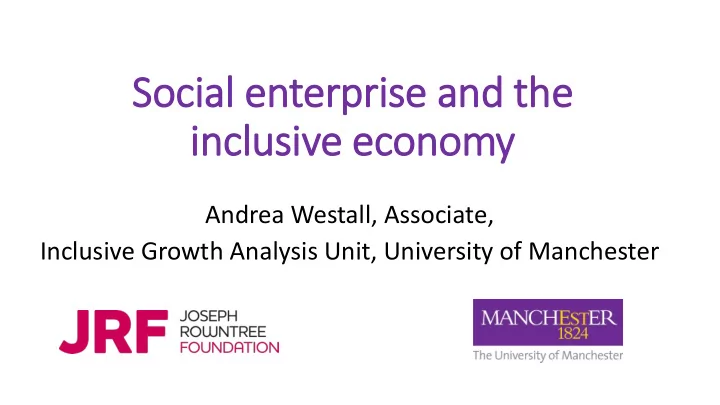

Social enterprise and the inclusive economy Andrea Westall, Associate, Inclusive Growth Analysis Unit, University of Manchester
Why an In Inclusive Economy? • Increasing awareness of widening economic and social inequalities for individuals and places, including in-work poverty • Long-run tendency (Piketty); future trends: eg automation • Unless - wars, pandemics, government, people • Realisation that current economic models/thinking inadequate for both left and right • Increasing recognition of role social enterprise/social economy within inclusive and sustainable economies (eg Stiglitz/OECD/ILO/UN/EU) as well as ‘responsible business’
Part of f GM history ry
Social enterprise and the inclusive economy • Addressing market failures such as access to jobs for vulnerable groups, unmet needs • Diversifying the economy so that more inclusive/productive/resilient and providing decent jobs • Transforming the economy – through economic, social, and environmental innovation - to better meet needs of people and planet
Responding to market and state failure • Directly engaging relatively disadvantaged people in the labour force • Inclusive employment policies • Creating new economic opportunities and meeting unmet needs • Underpinning and kickstarting local economic/community development
Part of f a diverse economy • Resilience and response to crisis • Improving productivity • Enabling innovation & response to changing economy • Creating or exemplifying ‘decent’ jobs • Influencing private sector behaviour
Transforming economies • Equating and increasing power in economic relations – eg secondary co-ops (creating scale and collaboration for self- employed); • Creating inclusive, collaborative and systemic approaches to local socio-economic development • Providing models of inclusive and sustainable economies eg sharing economies, fair trade, community assets • New models economic & participatory democracy/ governance
In International & UK city insights • Some international cities see social enterprise/social economy as part of diverse economy – mainstreamed and championed • Lots of examples around the UK, but lack of scale, awareness, or engagement in economic institutions • Developing cross-sector collaborations to meet systemic challenges • Need for more mapping; better evidenced and articulated impact; • New spaces for collaboration for local economic development • Better use IT for knowledge and resource sharing • Creative use of procurement to market-make • Not all social enterprises provide decent jobs and security
Social enterprise, , inclusive economies, , and the GM Strategy Priority 3 – Good jobs, with opportunities for people to progress and develop including “creating additional jobs in all parts of Greater Manchester ” • Related strategies: Work and Skills Strategy; Greater Manchester Industrial Strategy: • Related portfolios: Skills, employment and apprenticeships; Business and Economy Priority 4 – A thriving and productive economy in all parts of Greater Manchester • Related GM Strategies, include particularly: Industrial Strategy; Greater Manchester Spatial Framework; Greater Manchester Sector Strategies; Greater Manchester Social Enterprise Strategy; Community resilience strategy • Related portfolios – Business and Economy; and relevant institutions mentioned: Greater Manchester Business Growth Hub
Recommend
More recommend